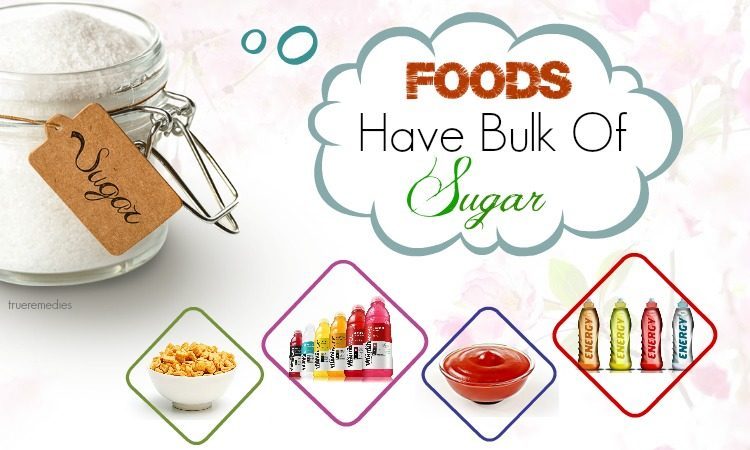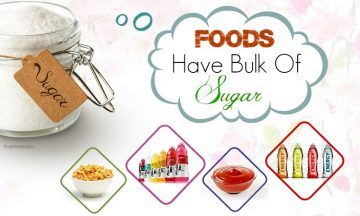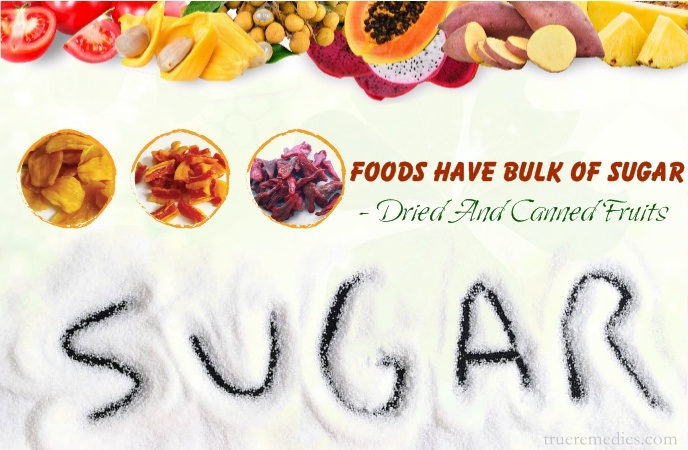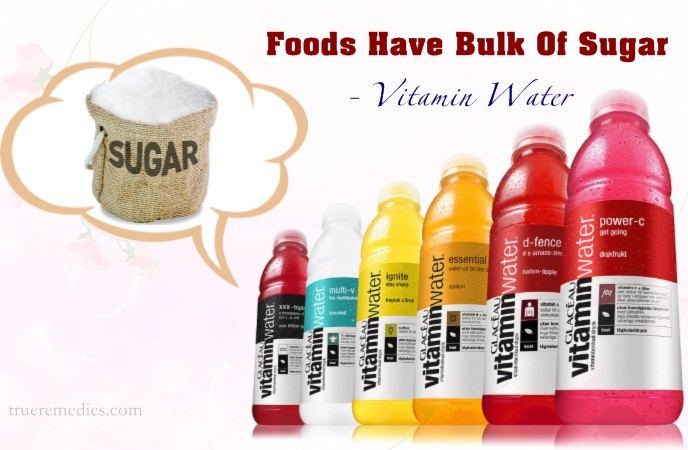Updated: 11/25/2019
Contents
Nowadays, overconsumption of sugar is an urgent topic within the society that links to the explosion of obesity in many countries[1]. This problem mainly derives from the majority of processed foods. We all acknowledge a host of negative health effects related to sugar, especially when it becomes a refined ingredient in unsuspecting foods. Unveil some “taste-good” foods and beverages that contain excess sugar to avoid so you can reduce the risk of many harmful diseases. Here are 8 shocking foods that you wouldn’t expect to have bulk of sugar.
- 10 Gout-Causing Foods High In Uric Acid You Need To Avoid
- Top 7 Common Foods That Cause Insomnia
- Top 10 Foods That Cause Headaches And Migraines
8 Foods That You Wouldn’t Expect To Have Bulk Of Sugar, According To Nutritionists
1. Breakfast Cereals
TrueRemedies Partner Solutions

Need a Help from the Leading Expert Online, Available 24/7?
They’re all here and ready to answer your questions online or by phone. Keep asking questions until you get the answer you need.
The main ingredient in granola bars is basically oats; nonetheless, they are not exactly the same and do not provide similar health benefits like plain rolled oats. While plain rolled oats are rich in carbs, fiber and protein, the extra nuts, dried fruits, honey or sweeteners in granola automatically increases the amount of sugar and calories. Therefore, 100 grams of granola bar includes 400 calories and are equivalent to 6 teaspoons of sugar.
If you are liberal with your diet, this recommendation doesn’t mean much but just try choosing the one with less added sugar or make your own serving to aim for a better health goal.
Hope that you have raised your awareness about foods that contain a large amount of sugar to avoid after reading our entry. Planning your diet plan requires knowledge and research so you can have a healthy body the best and most economical way.
If you have any comments about this topic, feel free to share with us below. For other such articles, please visit our main News & Facts page.
It is a fact that all fruits are natural sugar storages. But packaged and canned products are usually preserved in sugar syrup that adds unnecessary sugar to the fruits[14].
A ¼ cup of these fruits contains 44.5 grams of sugar, which exceeds the sugar limitation for an average person each day. It’s best to consume fresh fruits instead of heading up for dried or canned ones just because they are readily available in the market. The same goes for dried fruits as the drying process provides higher sugar content than the originals. If you choose to consume dried fruits, pay attention to the serving size.
8. Granola Bars
The main ingredient in granola bars is basically oats; nonetheless, they are not exactly the same and do not provide similar health benefits like plain rolled oats. While plain rolled oats are rich in carbs, fiber and protein, the extra nuts, dried fruits, honey or sweeteners in granola automatically increases the amount of sugar and calories. Therefore, 100 grams of granola bar includes 400 calories and are equivalent to 6 teaspoons of sugar.
If you are liberal with your diet, this recommendation doesn’t mean much but just try choosing the one with less added sugar or make your own serving to aim for a better health goal.
Hope that you have raised your awareness about foods that contain a large amount of sugar to avoid after reading our entry. Planning your diet plan requires knowledge and research so you can have a healthy body the best and most economical way.
If you have any comments about this topic, feel free to share with us below. For other such articles, please visit our main News & Facts page.
These sauces and ketchups are definitely tasty ingredients to marinade or dip in meat and veggies. You might be surprised that the key factors that create yummy tongue are sugar and salt, not to mention additives and preservatives in most sauces and ketchups.
Nevertheless, it is not good news especially for diabetic patients that a tablespoon of BBQ sauce can contain added sugar amount of 7 grams, while it takes 4 grams to the same amount of ketchup[13]. Not yet, up to 40% of the sauce’s ingredient is likely pure sugar. It is suggested to check the label of the sauce with the least sugar count as possible or incorporate your food with homemade marinades such as yogurt dips, hummus or coriander dips.
7. Dried And Canned Fruits
It is a fact that all fruits are natural sugar storages. But packaged and canned products are usually preserved in sugar syrup that adds unnecessary sugar to the fruits[14].
A ¼ cup of these fruits contains 44.5 grams of sugar, which exceeds the sugar limitation for an average person each day. It’s best to consume fresh fruits instead of heading up for dried or canned ones just because they are readily available in the market. The same goes for dried fruits as the drying process provides higher sugar content than the originals. If you choose to consume dried fruits, pay attention to the serving size.
8. Granola Bars
The main ingredient in granola bars is basically oats; nonetheless, they are not exactly the same and do not provide similar health benefits like plain rolled oats. While plain rolled oats are rich in carbs, fiber and protein, the extra nuts, dried fruits, honey or sweeteners in granola automatically increases the amount of sugar and calories. Therefore, 100 grams of granola bar includes 400 calories and are equivalent to 6 teaspoons of sugar.
If you are liberal with your diet, this recommendation doesn’t mean much but just try choosing the one with less added sugar or make your own serving to aim for a better health goal.
Hope that you have raised your awareness about foods that contain a large amount of sugar to avoid after reading our entry. Planning your diet plan requires knowledge and research so you can have a healthy body the best and most economical way.
If you have any comments about this topic, feel free to share with us below. For other such articles, please visit our main News & Facts page.
Yogurt is a beneficial source of good bacteria for your gut and regulates digestion system[10]. It can be highly nutritious too. Similar to any low-fat products, low-fat yogurts contain extra sugar levels for flavor[11] [12]. For instance, a single cup of low-fat yogurt is packed with 47 grams of sugar or more, while plain yogurt contains 19 grams of sugar per cup.
Unfortunately, these so-called “low-fat” do not seem to be more beneficial than a full-fat variant. It is best to choose full-fat, plain, whole-milk or Greek yogurt rather than choosing flavored yogurts. Feel free to add your own flavour in the form of fruit, nuts, or seeds.
6. Sauce And Ketchup
These sauces and ketchups are definitely tasty ingredients to marinade or dip in meat and veggies. You might be surprised that the key factors that create yummy tongue are sugar and salt, not to mention additives and preservatives in most sauces and ketchups.
Nevertheless, it is not good news especially for diabetic patients that a tablespoon of BBQ sauce can contain added sugar amount of 7 grams, while it takes 4 grams to the same amount of ketchup[13]. Not yet, up to 40% of the sauce’s ingredient is likely pure sugar. It is suggested to check the label of the sauce with the least sugar count as possible or incorporate your food with homemade marinades such as yogurt dips, hummus or coriander dips.
7. Dried And Canned Fruits
It is a fact that all fruits are natural sugar storages. But packaged and canned products are usually preserved in sugar syrup that adds unnecessary sugar to the fruits[14].
A ¼ cup of these fruits contains 44.5 grams of sugar, which exceeds the sugar limitation for an average person each day. It’s best to consume fresh fruits instead of heading up for dried or canned ones just because they are readily available in the market. The same goes for dried fruits as the drying process provides higher sugar content than the originals. If you choose to consume dried fruits, pay attention to the serving size.
8. Granola Bars
The main ingredient in granola bars is basically oats; nonetheless, they are not exactly the same and do not provide similar health benefits like plain rolled oats. While plain rolled oats are rich in carbs, fiber and protein, the extra nuts, dried fruits, honey or sweeteners in granola automatically increases the amount of sugar and calories. Therefore, 100 grams of granola bar includes 400 calories and are equivalent to 6 teaspoons of sugar.
If you are liberal with your diet, this recommendation doesn’t mean much but just try choosing the one with less added sugar or make your own serving to aim for a better health goal.
Hope that you have raised your awareness about foods that contain a large amount of sugar to avoid after reading our entry. Planning your diet plan requires knowledge and research so you can have a healthy body the best and most economical way.
If you have any comments about this topic, feel free to share with us below. For other such articles, please visit our main News & Facts page.
Fruit juices are often incorporated within healthy beverages; nonetheless, packaged ones are completely sugary storage containers[7]. They are payloads of carbs and fructose, along with artificial flavors and colors. For example, every 500ml of sweetened apple juice provides 26 grams of sugar. As for the soda, one can contain up to 39 grams of sugar, which oppose to the daily sugar limitation allowed for a healthy body.
Studies have shown that consuming high-fructose beverages potentially increases insulin resistance, therefore affecting the metabolic rate that can lead to increased cholesterol and triglyceride[8]. Furthermore, they increase the risk of diabetes and related diseases like fatty liver, cardiovascular disease, and obesity, according to a study[9]. A much preferable alternative is to consume flavoured water and unsweetened fruit juices.
5. Low-Fat Yogurt
Yogurt is a beneficial source of good bacteria for your gut and regulates digestion system[10]. It can be highly nutritious too. Similar to any low-fat products, low-fat yogurts contain extra sugar levels for flavor[11] [12]. For instance, a single cup of low-fat yogurt is packed with 47 grams of sugar or more, while plain yogurt contains 19 grams of sugar per cup.
Unfortunately, these so-called “low-fat” do not seem to be more beneficial than a full-fat variant. It is best to choose full-fat, plain, whole-milk or Greek yogurt rather than choosing flavored yogurts. Feel free to add your own flavour in the form of fruit, nuts, or seeds.
6. Sauce And Ketchup
These sauces and ketchups are definitely tasty ingredients to marinade or dip in meat and veggies. You might be surprised that the key factors that create yummy tongue are sugar and salt, not to mention additives and preservatives in most sauces and ketchups.
Nevertheless, it is not good news especially for diabetic patients that a tablespoon of BBQ sauce can contain added sugar amount of 7 grams, while it takes 4 grams to the same amount of ketchup[13]. Not yet, up to 40% of the sauce’s ingredient is likely pure sugar. It is suggested to check the label of the sauce with the least sugar count as possible or incorporate your food with homemade marinades such as yogurt dips, hummus or coriander dips.
7. Dried And Canned Fruits
It is a fact that all fruits are natural sugar storages. But packaged and canned products are usually preserved in sugar syrup that adds unnecessary sugar to the fruits[14].
A ¼ cup of these fruits contains 44.5 grams of sugar, which exceeds the sugar limitation for an average person each day. It’s best to consume fresh fruits instead of heading up for dried or canned ones just because they are readily available in the market. The same goes for dried fruits as the drying process provides higher sugar content than the originals. If you choose to consume dried fruits, pay attention to the serving size.
8. Granola Bars
The main ingredient in granola bars is basically oats; nonetheless, they are not exactly the same and do not provide similar health benefits like plain rolled oats. While plain rolled oats are rich in carbs, fiber and protein, the extra nuts, dried fruits, honey or sweeteners in granola automatically increases the amount of sugar and calories. Therefore, 100 grams of granola bar includes 400 calories and are equivalent to 6 teaspoons of sugar.
If you are liberal with your diet, this recommendation doesn’t mean much but just try choosing the one with less added sugar or make your own serving to aim for a better health goal.
Hope that you have raised your awareness about foods that contain a large amount of sugar to avoid after reading our entry. Planning your diet plan requires knowledge and research so you can have a healthy body the best and most economical way.
If you have any comments about this topic, feel free to share with us below. For other such articles, please visit our main News & Facts page.
Sport drinks are among favorite beverage options for elite athletes and sport men who require ready-to-use energy to refuel and hydrate their body[5]. We often mistake these drinks with healthy products for daily energizing; however, they are specifically designed to work out on people who exercise in a long, intense period. It is due to the extra amount of added sugar that replenishes and is transformed into energy quickly in an extremely exercising body. Therefore, if you are an athlete, sport drinks can be helpful during training or competition, but do not have a role outside of sport.
A standard 570 ml bottle of sport drinks contains a whopping amount of 32 grams of sugar which is equal to 8 teaspoons of sugar[6]. If you cannot fuel enough, these extra sugar will be stored at your waistline under the form of fat.
4. Packaged Fruit Juices And Soda
Fruit juices are often incorporated within healthy beverages; nonetheless, packaged ones are completely sugary storage containers[7]. They are payloads of carbs and fructose, along with artificial flavors and colors. For example, every 500ml of sweetened apple juice provides 26 grams of sugar. As for the soda, one can contain up to 39 grams of sugar, which oppose to the daily sugar limitation allowed for a healthy body.
Studies have shown that consuming high-fructose beverages potentially increases insulin resistance, therefore affecting the metabolic rate that can lead to increased cholesterol and triglyceride[8]. Furthermore, they increase the risk of diabetes and related diseases like fatty liver, cardiovascular disease, and obesity, according to a study[9]. A much preferable alternative is to consume flavoured water and unsweetened fruit juices.
5. Low-Fat Yogurt
Yogurt is a beneficial source of good bacteria for your gut and regulates digestion system[10]. It can be highly nutritious too. Similar to any low-fat products, low-fat yogurts contain extra sugar levels for flavor[11] [12]. For instance, a single cup of low-fat yogurt is packed with 47 grams of sugar or more, while plain yogurt contains 19 grams of sugar per cup.
Unfortunately, these so-called “low-fat” do not seem to be more beneficial than a full-fat variant. It is best to choose full-fat, plain, whole-milk or Greek yogurt rather than choosing flavored yogurts. Feel free to add your own flavour in the form of fruit, nuts, or seeds.
6. Sauce And Ketchup
These sauces and ketchups are definitely tasty ingredients to marinade or dip in meat and veggies. You might be surprised that the key factors that create yummy tongue are sugar and salt, not to mention additives and preservatives in most sauces and ketchups.
Nevertheless, it is not good news especially for diabetic patients that a tablespoon of BBQ sauce can contain added sugar amount of 7 grams, while it takes 4 grams to the same amount of ketchup[13]. Not yet, up to 40% of the sauce’s ingredient is likely pure sugar. It is suggested to check the label of the sauce with the least sugar count as possible or incorporate your food with homemade marinades such as yogurt dips, hummus or coriander dips.
7. Dried And Canned Fruits
It is a fact that all fruits are natural sugar storages. But packaged and canned products are usually preserved in sugar syrup that adds unnecessary sugar to the fruits[14].
A ¼ cup of these fruits contains 44.5 grams of sugar, which exceeds the sugar limitation for an average person each day. It’s best to consume fresh fruits instead of heading up for dried or canned ones just because they are readily available in the market. The same goes for dried fruits as the drying process provides higher sugar content than the originals. If you choose to consume dried fruits, pay attention to the serving size.
8. Granola Bars
The main ingredient in granola bars is basically oats; nonetheless, they are not exactly the same and do not provide similar health benefits like plain rolled oats. While plain rolled oats are rich in carbs, fiber and protein, the extra nuts, dried fruits, honey or sweeteners in granola automatically increases the amount of sugar and calories. Therefore, 100 grams of granola bar includes 400 calories and are equivalent to 6 teaspoons of sugar.
If you are liberal with your diet, this recommendation doesn’t mean much but just try choosing the one with less added sugar or make your own serving to aim for a better health goal.
Hope that you have raised your awareness about foods that contain a large amount of sugar to avoid after reading our entry. Planning your diet plan requires knowledge and research so you can have a healthy body the best and most economical way.
If you have any comments about this topic, feel free to share with us below. For other such articles, please visit our main News & Facts page.
Vitamin water is well entitled as a healthy drink with a great amount of vitamins and minerals. However, just like any other beverages that are marketed “healthy drinks”, it gives you a shocking amount of extra sugar. One bottle can be a powerhouse of 32g of sugar and 120 calories. It is high in fructose, not glucose, which studies show affect our bodies detrimentally[3] [4].
You should forget all these health claims and make a wise move to be away from those products. Plain water or self-made flavoured waters are much healthier to help hydrate and refill the essential nutrition loss in your body.
3. Sport Drinks
Sport drinks are among favorite beverage options for elite athletes and sport men who require ready-to-use energy to refuel and hydrate their body[5]. We often mistake these drinks with healthy products for daily energizing; however, they are specifically designed to work out on people who exercise in a long, intense period. It is due to the extra amount of added sugar that replenishes and is transformed into energy quickly in an extremely exercising body. Therefore, if you are an athlete, sport drinks can be helpful during training or competition, but do not have a role outside of sport.
A standard 570 ml bottle of sport drinks contains a whopping amount of 32 grams of sugar which is equal to 8 teaspoons of sugar[6]. If you cannot fuel enough, these extra sugar will be stored at your waistline under the form of fat.
4. Packaged Fruit Juices And Soda
Fruit juices are often incorporated within healthy beverages; nonetheless, packaged ones are completely sugary storage containers[7]. They are payloads of carbs and fructose, along with artificial flavors and colors. For example, every 500ml of sweetened apple juice provides 26 grams of sugar. As for the soda, one can contain up to 39 grams of sugar, which oppose to the daily sugar limitation allowed for a healthy body.
Studies have shown that consuming high-fructose beverages potentially increases insulin resistance, therefore affecting the metabolic rate that can lead to increased cholesterol and triglyceride[8]. Furthermore, they increase the risk of diabetes and related diseases like fatty liver, cardiovascular disease, and obesity, according to a study[9]. A much preferable alternative is to consume flavoured water and unsweetened fruit juices.
5. Low-Fat Yogurt
Yogurt is a beneficial source of good bacteria for your gut and regulates digestion system[10]. It can be highly nutritious too. Similar to any low-fat products, low-fat yogurts contain extra sugar levels for flavor[11] [12]. For instance, a single cup of low-fat yogurt is packed with 47 grams of sugar or more, while plain yogurt contains 19 grams of sugar per cup.
Unfortunately, these so-called “low-fat” do not seem to be more beneficial than a full-fat variant. It is best to choose full-fat, plain, whole-milk or Greek yogurt rather than choosing flavored yogurts. Feel free to add your own flavour in the form of fruit, nuts, or seeds.
6. Sauce And Ketchup
These sauces and ketchups are definitely tasty ingredients to marinade or dip in meat and veggies. You might be surprised that the key factors that create yummy tongue are sugar and salt, not to mention additives and preservatives in most sauces and ketchups.
Nevertheless, it is not good news especially for diabetic patients that a tablespoon of BBQ sauce can contain added sugar amount of 7 grams, while it takes 4 grams to the same amount of ketchup[13]. Not yet, up to 40% of the sauce’s ingredient is likely pure sugar. It is suggested to check the label of the sauce with the least sugar count as possible or incorporate your food with homemade marinades such as yogurt dips, hummus or coriander dips.
7. Dried And Canned Fruits
It is a fact that all fruits are natural sugar storages. But packaged and canned products are usually preserved in sugar syrup that adds unnecessary sugar to the fruits[14].
A ¼ cup of these fruits contains 44.5 grams of sugar, which exceeds the sugar limitation for an average person each day. It’s best to consume fresh fruits instead of heading up for dried or canned ones just because they are readily available in the market. The same goes for dried fruits as the drying process provides higher sugar content than the originals. If you choose to consume dried fruits, pay attention to the serving size.
8. Granola Bars
The main ingredient in granola bars is basically oats; nonetheless, they are not exactly the same and do not provide similar health benefits like plain rolled oats. While plain rolled oats are rich in carbs, fiber and protein, the extra nuts, dried fruits, honey or sweeteners in granola automatically increases the amount of sugar and calories. Therefore, 100 grams of granola bar includes 400 calories and are equivalent to 6 teaspoons of sugar.
If you are liberal with your diet, this recommendation doesn’t mean much but just try choosing the one with less added sugar or make your own serving to aim for a better health goal.
Hope that you have raised your awareness about foods that contain a large amount of sugar to avoid after reading our entry. Planning your diet plan requires knowledge and research so you can have a healthy body the best and most economical way.
If you have any comments about this topic, feel free to share with us below. For other such articles, please visit our main News & Facts page.
Breakfast cereals are upon common choices to start a new day since they are readily available, time-saving, portable and very tasty. But did you know that most cereals are highly processed and hinder payloads of sugar, especially those designed to attract children? Furthermore, they provide little or no protein, resulting in increasing blood sugar levels if you eat them every day. Some contain average 28 grams (7.1 tsp) sugar per cup-serving, take up 23% of sugar in total ingredients while there are only 7 grams of protein per serving[2].
Try selecting these ready-to-eat products with less added flavors and a small amount of sugar such as plain corn flakes and Rice Krispies. Better yet, prepare yourself a quick low-carb breakfast rich in protein like omelets.
2. Vitamin Water
Vitamin water is well entitled as a healthy drink with a great amount of vitamins and minerals. However, just like any other beverages that are marketed “healthy drinks”, it gives you a shocking amount of extra sugar. One bottle can be a powerhouse of 32g of sugar and 120 calories. It is high in fructose, not glucose, which studies show affect our bodies detrimentally[3] [4].
You should forget all these health claims and make a wise move to be away from those products. Plain water or self-made flavoured waters are much healthier to help hydrate and refill the essential nutrition loss in your body.
3. Sport Drinks
Sport drinks are among favorite beverage options for elite athletes and sport men who require ready-to-use energy to refuel and hydrate their body[5]. We often mistake these drinks with healthy products for daily energizing; however, they are specifically designed to work out on people who exercise in a long, intense period. It is due to the extra amount of added sugar that replenishes and is transformed into energy quickly in an extremely exercising body. Therefore, if you are an athlete, sport drinks can be helpful during training or competition, but do not have a role outside of sport.
A standard 570 ml bottle of sport drinks contains a whopping amount of 32 grams of sugar which is equal to 8 teaspoons of sugar[6]. If you cannot fuel enough, these extra sugar will be stored at your waistline under the form of fat.
4. Packaged Fruit Juices And Soda
Fruit juices are often incorporated within healthy beverages; nonetheless, packaged ones are completely sugary storage containers[7]. They are payloads of carbs and fructose, along with artificial flavors and colors. For example, every 500ml of sweetened apple juice provides 26 grams of sugar. As for the soda, one can contain up to 39 grams of sugar, which oppose to the daily sugar limitation allowed for a healthy body.
Studies have shown that consuming high-fructose beverages potentially increases insulin resistance, therefore affecting the metabolic rate that can lead to increased cholesterol and triglyceride[8]. Furthermore, they increase the risk of diabetes and related diseases like fatty liver, cardiovascular disease, and obesity, according to a study[9]. A much preferable alternative is to consume flavoured water and unsweetened fruit juices.
5. Low-Fat Yogurt
Yogurt is a beneficial source of good bacteria for your gut and regulates digestion system[10]. It can be highly nutritious too. Similar to any low-fat products, low-fat yogurts contain extra sugar levels for flavor[11] [12]. For instance, a single cup of low-fat yogurt is packed with 47 grams of sugar or more, while plain yogurt contains 19 grams of sugar per cup.
Unfortunately, these so-called “low-fat” do not seem to be more beneficial than a full-fat variant. It is best to choose full-fat, plain, whole-milk or Greek yogurt rather than choosing flavored yogurts. Feel free to add your own flavour in the form of fruit, nuts, or seeds.
6. Sauce And Ketchup
These sauces and ketchups are definitely tasty ingredients to marinade or dip in meat and veggies. You might be surprised that the key factors that create yummy tongue are sugar and salt, not to mention additives and preservatives in most sauces and ketchups.
Nevertheless, it is not good news especially for diabetic patients that a tablespoon of BBQ sauce can contain added sugar amount of 7 grams, while it takes 4 grams to the same amount of ketchup[13]. Not yet, up to 40% of the sauce’s ingredient is likely pure sugar. It is suggested to check the label of the sauce with the least sugar count as possible or incorporate your food with homemade marinades such as yogurt dips, hummus or coriander dips.
7. Dried And Canned Fruits
It is a fact that all fruits are natural sugar storages. But packaged and canned products are usually preserved in sugar syrup that adds unnecessary sugar to the fruits[14].
A ¼ cup of these fruits contains 44.5 grams of sugar, which exceeds the sugar limitation for an average person each day. It’s best to consume fresh fruits instead of heading up for dried or canned ones just because they are readily available in the market. The same goes for dried fruits as the drying process provides higher sugar content than the originals. If you choose to consume dried fruits, pay attention to the serving size.
8. Granola Bars
The main ingredient in granola bars is basically oats; nonetheless, they are not exactly the same and do not provide similar health benefits like plain rolled oats. While plain rolled oats are rich in carbs, fiber and protein, the extra nuts, dried fruits, honey or sweeteners in granola automatically increases the amount of sugar and calories. Therefore, 100 grams of granola bar includes 400 calories and are equivalent to 6 teaspoons of sugar.
If you are liberal with your diet, this recommendation doesn’t mean much but just try choosing the one with less added sugar or make your own serving to aim for a better health goal.
Hope that you have raised your awareness about foods that contain a large amount of sugar to avoid after reading our entry. Planning your diet plan requires knowledge and research so you can have a healthy body the best and most economical way.
If you have any comments about this topic, feel free to share with us below. For other such articles, please visit our main News & Facts page.











